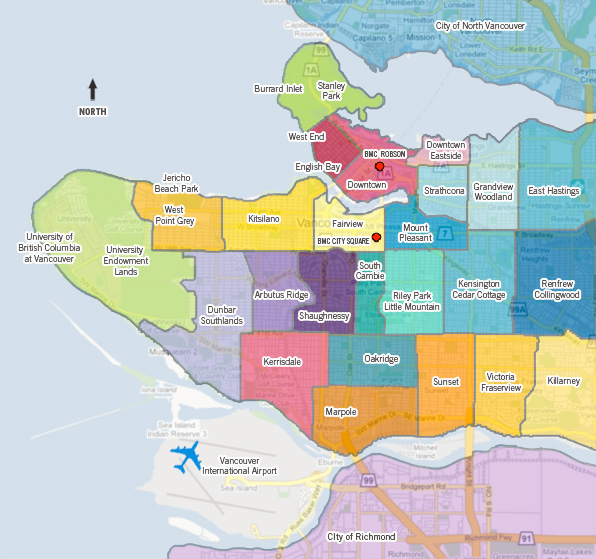Lemme explain you a little bit about Vancouver. Is Canada's third most populated city, with around 2.3 million people in its metropolitan area. It sits in an earthquakes zones. It has warm summers but wet winters and springs; you have to get used to the rain but at least it's not like the rest of Canada with -20 degrees and snow for the whole winter...
 Canada has two official languages, English and French, but in all the west coast most common language is English, hardly people talk French here, but you'll see almost everything in both languages everywhere,
Canada has two official languages, English and French, but in all the west coast most common language is English, hardly people talk French here, but you'll see almost everything in both languages everywhere,
Vancouver is pretty close to US, with no more than 45 minutes you're already there, and in over couple hours you're already in Seattle, so if you have a car is worth it go often to US to fill up gas or buy some grocery, and you can save few bucks.
 |
| Canada Day Fireworks |
Vancouver is an ethnically city. There's people from every single place of the world and you can see all these different cultures living at the same time. There's lots of festivals during the year where you can learn and experience about another culture, like the Chinese New Year, Canada Day, Italian Festival, CelticFest, Carnaval del Sol, etc
About business, British Columbia, with Vancouver as a main point of reference, has one of the most prosperous economies in Canada. The main buisness is Oil & Gas but at the same time has variety of other industries like technologies and software development. This economy is constantly growing up so they need constantly workers, for this reason the government is accepting a lot immigrants every year.
 |
| UBC Campus |
Vancouver has two major universities : The University if British Columbia (UBC) and Simon Fraser University (SFU). At the same time, there's the British Columbia Institute of Technology (BCIT) that provides more technical and polytechnic education. They offer some degrees like the universities, but it's more focus for trades and specific courses. Vancouver has also many community collages and private schools.
The government provides elementary schools that unless you opt for a private school, it will be free and determinate by where you live.
Where to live in Vancouver... that's a common question. Vancouver is an expensive city to live in. To have an idea, late 2012, the average home cost was $684.000, much more expensive than in Toronto $479.000, Calgary $420.000 or Ottawa $337.000. Here you can see a map dividing the city in the different districts. The most popular ones would be Downtown, Fairwiew, Kitsilano, Oakridge and South Cambie.
In my opinion almost all these areas are pretty expensive to rent a room, apartment or basement, but they're the nicest ones. When I just started to look for a room I was focused only in Downtown for the convenience, but after a while I realised that any place close to the Skytrain is the same or better and it's much affordable.
 |
| Vancouver Districts |
Two of the best websites to look for housing around the area of Vancouver would be:
- http://vancouver.en.craigslist.ca/
- http://www.kijiji.ca/h-british-columbia/9007
Talking about getting around the city, Vancouver offers lots of different options for public transport, from buses and ferries to commuter rail services. The most efficient one would be the Skytrain, a light metro system. It has three lines the Expo Line (dark blue line), Millennium Line (yellow line) and the Canada Line (light blue line). This last one is the one that is going to the Airport.
A part of the Skytrain you'll have the West Coast Express. This is a train going from Waterfront Station to Mission Station, linking Downtown Vancouver, Port Moody, Coquitlam, Pitt Meadows, Maple Ridge and Mission.
- The Expo Line connects Waterfront Station in Vancouver to King George Station in Surrey, and it's going through Vancouver, South Burnaby, New Westminster and Surrey.
- The Millennium Line shares tracks with Expo Line from Waterfront Station to Columbia Station in New Westminster and then continues until VCC-Clark Station in Vancouver again, going through North Burnaby and East Vancouver.
- The Canada Line begins at Waterfront Station as well, and goes south through Vancouver and the City of Richmond. From Bridgeport Station it splits into two branches, one heading west direction YVR-Airport Station and the other one continuing south to Richmond-Brighouse Station. At Bridgeport Station you can also take the bus to take the ferry to the Island.

A part of the Skytrain you'll have the West Coast Express. This is a train going from Waterfront Station to Mission Station, linking Downtown Vancouver, Port Moody, Coquitlam, Pitt Meadows, Maple Ridge and Mission.
 |
| SeaBus |
Another important transport available is the SeaBus. This is a passenger-only ferry service that connects Vancouver and North Vancouver. The ferries operate between approximately 6:00 a.m. and 1:00 a.m. daily. During the week, from Monday to Saturday, there's a boat every 15 minutes. Evenings and weekends service will be reduced to a 30 minutes.
All these services are integrated with the huge bus network around the whole city, and it's manage it by TransLink. It's introducing a smart card based on an electronic payment system called the Compass Card to replace existing monthly and daily passes, tickets and cash.
 |
| Skytain Map |
You can find more information in the next link: http://www.translink.ca/


